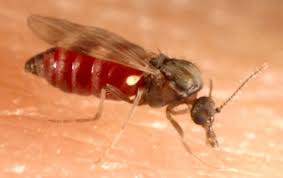Bluetongue
20 September 2016Since September 2015 there have been 288 outbreaks of bluetongue disease in France. As things stand the north of France remains clear of infection. This provides the UK some protection from infection as the disease is most likely to enter with midges blown over the English Channel from Northern France into Southern England.
So far bluetongue has not been found in the UK in 2016 but the highest risk month is September. Vaccines are now available for use in UK herds and flocks to allow you to protect your animals. Two different vaccines are currently available. Both require two vaccines to be given three weeks apart. Animals are not fully protected from disease until 20-30 days after the second vaccination (see the datasheet for more information).
Most of the outbreaks in France have been found by testing being carried out to look for infection. In these outbreaks the farmers were not aware of a disease problem in their animals. On some affected farms clinical signs have been seen. Infected animals have shown fever, poor appetite, sores on the muzzle and reddened muzzles. There have been animals with swollen heads, watery eyes, runny nose, drooling and breathing difficulties.
Most outbreaks in France have been in cattle. If sheep become infected they usually show more severe signs of disease. Signs which may be seen in sheep are fever and poor appetite, irritation of the muzzle, a swollen face, drooling, runny eyes and nose. Breathing difficulties and very occasionally the blue colour to the tongue which gives the disease its name.
Bluetongue is spread by biting midges so you could consider measures such as not grazing animals in the most heavily midge infested pastures. Areas with trees and water courses are favourite spots for midges so keeping livestock away from these areas if the disease is detected in your area may be useful. There are chemical sprays and pour-ons which can be used to reduce the risk of midges biting.
Remember that Bluetongue is a notifiable disease so if you suspect the disease in your herd or flock you must report it to the duty vet at APHA.
England: 03000 200 301, Wales: 07000 780144, Scotland: Contact your nearest APHA Office
Marion McMillian, marion.mcmillian@sac.co.uk
Sign up to the FAS newsletter
Receive updates on news, events and publications from Scotland’s Farm Advisory Service

